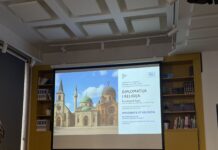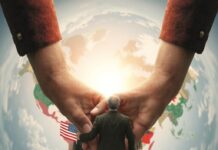Wednesday, November 23rd 2016

For America’s Public Diplomacy, no time to waste
Donald M. Bishop
As all wait for President-elect Trump’s cabinet nominations, it’s not too soon to begin thinking about the grave challenges America faces in public diplomacy. There’s no time to waste.
Had Hillary Clinton been elected, her administration would simply have launched an updated version of her “smart power” philosophy. She would have named another media executive as the next under secretary of State for Public Diplomacy and Public Affairs. Acolytes from the campaign and the Clinton Foundation would have parachuted into State to think the big ideas — and expect the Foreign Service to do all the hard work.
Gaining international support for the new administration’s initiatives will surely require deft thinking and the right words by the president’s team — and by ambassadors and Foreign Service Officers at American embassies.
A new menu item at the State Department cafeteria shouldn’t wait for the inauguration: triple espressos.
Donald Trump has provided many cues to his new policy directions, but not so many details. They need elaboration, and how to present them to governments and publics overseas in the coming weeks and months needs careful planning.
The public diplomacy officers of the Foreign Service know how, they just need the nod to get started.
The ideological challenges of Russia, China, and ISIS still loom large. Garnering the most attention have been email hacking, the “firehose of falsehoods” on social media, and related cyber threats. National security specialists are fleshing out how these malign operations link with “hybrid warfare” and “gray zone” conflicts.
More important than the media and social media, however, are the ideas they communicate. If America — and the West more largely — are engaged in a “war of ideas,” what are the ideas we advocate?
The election has shown that many of the old narratives — whether conservative or liberal — are stale. The administration needs our Foreign Service Officers at the table when they discuss the renewing of American ideals.
To explain and advocate American policies and values overseas, the new under secretary of State for Public Diplomacy and Public Affairs will have the lead. Alas, selection, vetting, clearance, and confirmation may run many months past the inauguration. And it will take many more months for the new appointee to learn what public diplomacy can and can’t do. But time is not our friend.
Without an under secretary, public diplomacy will not be aboard during the early months of change. It will miss the time when Congress will be most receptive to new initiatives.
President Trump should, then, apply some of his leadership and management moxie.
First, the president, the new secretary of State, and the transition team should agree to empower the career officer who will be acting under secretary to launch internal reforms on the administration’s Day One.
To relearn how to counter propaganda and disinformation.
To lengthen and strengthen Public Diplomacy training.
To emphasize “education” as much as “training” at the Foreign Service Institute.
To send more public diplomacy people to key military commands.
To learn more about public affairs, crisis management, survey research, and related fields from American corporations.
To plan for “more” here and “less” there.
With his feel for organizations, President-elect Trump can put an eagle eye on the stovepipes that divide and enfeeble America’s informational power.
It’s not just that public affairs, public diplomacy, the U.S. government’s overseas broadcasting networks, and the armed forces’ information operations don’t work together; it’s not just that there are outdated obstacles to their cooperation; it’s that each barely understands what the others do.
This means that overseas the need is to strengthen the role of the embassy public affairs officer to assure that all U.S. agencies pull together.
The president-elect knows that organizational change works best when it is “bottom up” rather than “top down.” In the public diplomacy context, this means giving its dedicated Foreign Service Officers some rein. This means not waiting for a new under secretary to launch and approve every initiative that is needed now, not later.
The public diplomacy officers of the Foreign Service are patriotic, non-partisan, knowledgeable, multilingual, and talented. They know best how to advocate for the new president’s policies in different nations and cultures — and how to heal and strengthen American public diplomacy.
Mr. Trump, give the nod. Let them begin now.
Bishop is Bren Chair of Strategic Communications at Marine Corps University, following 31 years as a Foreign Service Officer who led U.S. Public Diplomacy in Bangladesh, Nigeria, China, and Afghanistan.
The views expressed by Contributors are their own and are not the views of The Hill
– – – – – – –
This essay was first published on November 22, 2016, by TheHill Online. The editor provided a new headline.

Donald M. Bishop is the Bren Chair of Strategic Communications at Marine Corps University in Quantico, Virginia.
Mr. Bishop served as a Foreign Service Officer – first in the U.S. Information Agency and then in the Department of State – for 31 years. Specializing in Public Diplomacy, political-military affairs, and East Asia, he attained the rank of Minister-Counselor in the career service. He was President of the Public Diplomacy Council from 2013 to 2015 and is now a member of the Board of Directors.
…click authors name for more info
Author: Donald M. Bishop
We welcome comments from our readers that advocate and shed light on the subject of public diplomacy. We avoid discussion that is politically partisan, commercial in nature or offensive. To prevent inappropriate comments and spam we screen each comment before publishing it, so please excuse us if you do not see your remark right away.













